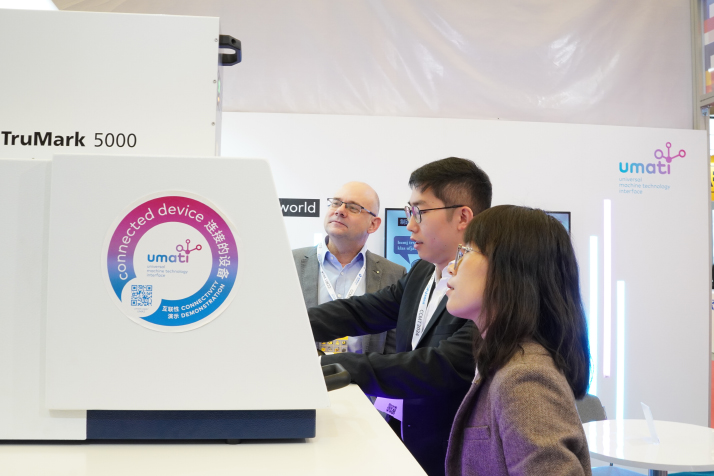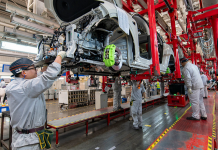This year’s exhibition attracted nearly 2,000 machine tool companies from 28 countries and regions. Among them, German companies covered 4,675 square meters, making them the largest foreign exhibitor group.

China’s opportunities
“In the past decades, the Chinese mechanical industry has played a significant role in the global market. German manufacturers have also made considerable efforts to strengthen their business ties with China,” Markus Heering, Executive Director of the German Machine Tool Builders’ Association (VDW), told Beijing Review.
According to a regular survey conducted by the VDW, China had 13 German machine tool production facilities in China as of late 2022.
That same year, German companies witnessed a 23-percent growth in machine tool production in China, with a production output worth 811 million euros ($864 million).
In 2023, actual exports of German machine tools (including parts and components) to China grew by 6 percent, reaching 1.65 billion euros ($1.76 billion), with China maintaining its position as the top export market for the German machine tool industry, accounting for 17 percent of total shares.
The VDW believes China will continue to exhibit strong demand for “German-made” hi-tech manufacturing technologies in the future.
Germany, renowned for its wide range of product offerings, provides numerous innovative solutions for a range of manufacturing needs.
These products play a crucial role in supporting China’s automotive, aerospace, mechanical engineering, power generation, medical engineering, and other industries that rely on different machine tools.
Umati showcase
As one of the largest machine tool fairs in China and Asia at large, the CCMT 2024 facilitated the widespread dissemination of innovative elements for enhanced productivity and quality.
For German exhibitors, a key focus at the CCMT 2024 was the universal machine technology interface (umati), which they intended to promote extensively at the fair.
The umati, operated jointly by the VDW and the Mechanical Engineering Industry Association (VDMA), which represents 3,600 German and European mechanical and plant engineering companies, is an initiative designed to standardize communication protocols and interfaces for machines within the manufacturing ecosystem.
It gathers machine builders, software developers, component suppliers and users in a strong global community to advocate for the adoption of open, standardized interfaces. The primary goal is to simplify connectivity, improve visibility and ensure security in manufacturing processes.
“Data are valuable in the digital age, but how do we turn data into value? The first step is to adapt data to machine tools, where they can generate value. The umati was born to achieve this goal and all parties will benefit from the digital transformation,” said Alexander Broos, Director of Research and Technology at the VDW and the umati’s project manager.
Since its introduction in 2017, the umati has provided a platform for manufacturers, developers and suppliers to exchange experiences and share information.
Currently, there are about 350 umati partners worldwide, with half of the members being non-German companies, including seven from China.
“By promoting open communication interfaces and standardized connection protocols, the umati seeks to improve operational efficiency, simplify production processes and open up new channels for innovation. As a global initiative supported by industry stakeholders worldwide, the umati embodies the spirit of cooperation and collective progress,” Broos explained.
Broos further underlined that in the process of globalization, data-driven businesses are also globalizing. “I think it’s essential for both Germany and China to stay connected with the outside world. Digital connection requires a platform where people can share ideas and products, and that’s our original intention in promoting the umati,” Broos added.
In June 2021, the VDW set up a representative office in the China (Shanghai) Pilot Free Trade Zone Waigaoqiao International Intelligent Manufacturing Industrial Park, in the city’s Pudong New Area. A pilot free trade zone in China is a designated area intended for testing and implementing economic and trade policies to promote economic reform, liberalization and foreign investment.
At the park, the VDW, together with the Shanghai Pudong Intelligent Manufacturing Association, established the Intelligent Manufacturing Internet of Things Exhibition Hall, showcasing pioneering industrial digital application achievements.
The joint undertaking aims to promote the umati in China, marking a crucial step for integrating German Industry 4.0, a term that originated in Germany and refers to the ongoing automation and digitization of traditional manufacturing and industrial practices, into China’s smart manufacturing system.
In November 2023, the exhibition hall, covering some 500 square meters, officially opened.
Through this platform, participants, too, can showcase their smart production technologies to the public and meet potential customers and partners. –The Daily Mail-Beijing Review news exchange item






